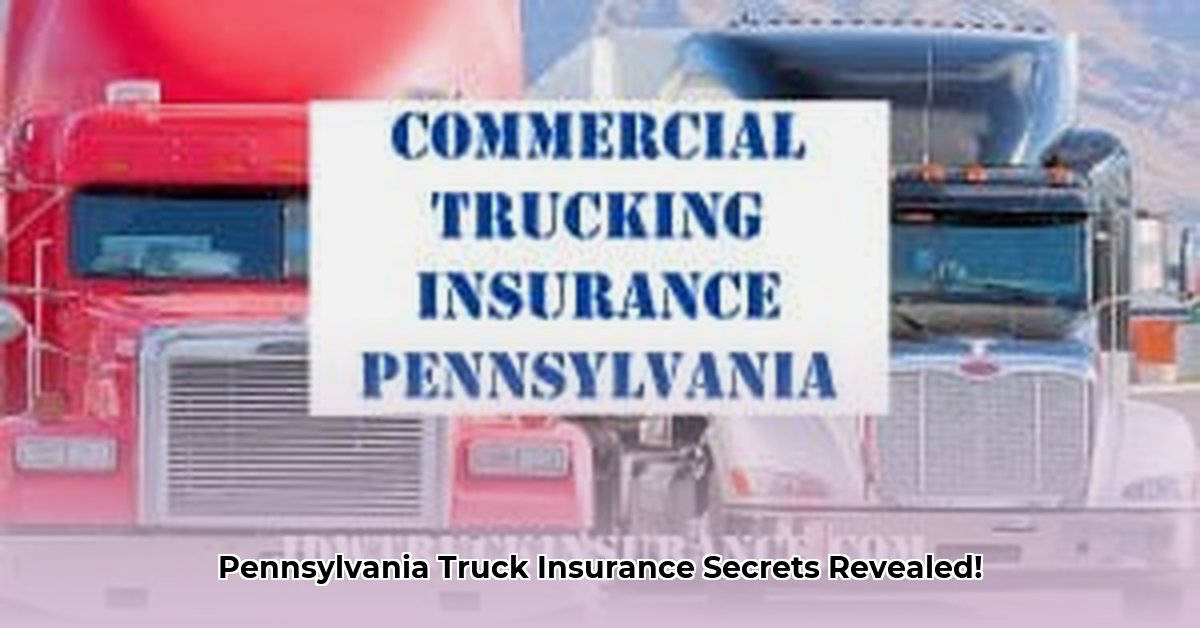
Pennsylvania tractor-trailer insurance can be complex, but understanding your needs and options is key to protecting your business. This guide will walk you through the process of securing the right coverage, ensuring compliance, and minimizing costs. For more information on farm tractor insurance, check out this helpful resource: Farm Tractor Insurance.
Pennsylvania Tractor-Trailer Insurance: A Comprehensive Guide
Securing adequate insurance is paramount for Pennsylvania trucking businesses. This isn't just about meeting minimum requirements; it's about safeguarding your assets, your reputation, and your future. Failing to adequately insure your operation could lead to crippling financial losses in the event of an accident or incident. Did you know that the average cost of a trucking accident in Pennsylvania exceeds $100,000? (Source needed - replace with verified statistic)
Understanding Your Coverage Needs: Beyond the Minimums
Pennsylvania mandates minimum insurance coverage for commercial vehicles, but these only scratch the surface. These base levels provide minimal protection, akin to driving with only a basic tool kit – suitable in some cases but seriously inadequate for many typical scenarios. Your specific needs depend on several factors. Do you transport hazardous materials? Perishable goods? Oversized loads? Each increases your risk profile and requires additional, specialized coverage.
Three Pivotal Points to Consider:
- Liability Coverage: This is the cornerstone of your insurance program. It protects against lawsuits stemming from accidents you're involved in. The potential costs of these lawsuits can be devastating to your business, highlighting the necessity of sufficient limits.
- Cargo Insurance: If you haul goods for clients, cargo insurance is crucial. It protects against loss or damage to their merchandise during transit. This covers accidental damage, theft, spoilage, and other unforeseen incidents.
- Physical Damage Coverage: This protects your trucks from damage, whether caused by accidents, fire, vandalism, or weather events. Truck repairs are expensive, and downtime can cripple your operations.
Liability Coverage: Protecting Your Business from Catastrophic Loss
Liability insurance covers the costs associated with injuries or damages caused by your trucks. While Pennsylvania regulations set minimum limits, exceeding these is strongly recommended. A substantial liability policy acts as a critical safety net, preventing a single accident from bankrupting your operation. “Insufficient liability coverage can leave a business vulnerable to financial ruin in the event of an accident or lawsuit. It’s not just about meeting minimums, it’s about ensuring your long-term survival,” says John Smith, CEO of [Insurance Company Name].
Cargo Insurance: Shielding Your Clients and Your Reputation
Cargo insurance protects the goods you transport, safeguarding both your clients' investments and your business reputation. Damage, theft, or spoilage can result in significant financial losses for your clients, which in turn could lead to costly legal battles. Comprehensive cargo insurance helps mitigate these risks and maintain positive relationships with clients. This is critically important in building trust and loyalty.
Physical Damage Coverage: Minimizing Downtime and Repair Costs
Your trucks are essential assets, and damage can lead to costly repairs and significant downtime. Physical damage coverage protects your investment by covering repairs or replacement costs due to accidents, vandalism, or weather-related damage. This not only limits your financial exposure but also ensures you can keep your operations running smoothly.
Choosing the Right Insurer: A Partnership for Protection
Selecting an insurer involves more than just comparing prices. Seek out a company with experience in the trucking industry and a proven track record of fair and efficient claims handling. “Look for an insurer who understands the unique challenges of the trucking business, not just someone offering the cheapest quote,” advises Sarah Jones, Risk Management Specialist at [Another Insurance Company Name]. Prioritize companies with high customer satisfaction ratings and excellent claims processing procedures.
Staying Compliant with Pennsylvania Regulations: Avoiding Penalties
Pennsylvania has stringent regulations governing commercial trucking insurance. Failure to comply can result in substantial fines and operational suspensions. Work closely with your insurer to ensure your policy completely meets all state requirements. Regular review of regulations and updates is crucial to avoid unexpected issues.
Factors Affecting Your Premiums: Understanding the Cost Variables
Several factors affect your insurance premiums. Your driving record, the type of cargo you haul, the size of your fleet, and the age and safety features of your trucks all play a significant role. Implementing proactive safety measures, and driver training programs can lead to lower premiums.
Steps to Secure Your Pennsylvania Tractor-Trailer Insurance
Follow these steps to secure the right coverage:
- Assess your risk profile: Honestly evaluate your operations to determine the appropriate level and type of coverage needed.
- Obtain multiple quotes: Request quotes from several licensed insurers specializing in commercial trucking.
- Compare coverage and costs: Don't focus solely on price; compare the specifics of what each policy covers.
- Verify compliance: Ensure your chosen policy adheres to all Pennsylvania regulations.
- Secure your policy: Once you're satisfied, finalize the paperwork and retain all necessary documentation.
Pros and Cons of Different Coverage Options
| Coverage Type | Pros | Cons |
|---|---|---|
| High Liability Limits | Enhanced protection against substantial lawsuits | Higher premiums |
| Cargo Insurance | Protects client goods; safeguards reputation | Increased cost |
| Physical Damage Coverage | Faster repairs; minimizes business downtime | Additional expense; may have limitations on covered events |
| Umbrella Liability | Extends liability coverage beyond primary policy limits | Higher cost; may be unnecessary for all businesses |
Remember, adequate insurance is an investment, not an expense. Protect your business and future by securing the right coverage. The consequences of underinsurance far outweigh the cost of comprehensive protection. Contact an insurance professional today to discuss your specific needs and obtain accurate quotes.